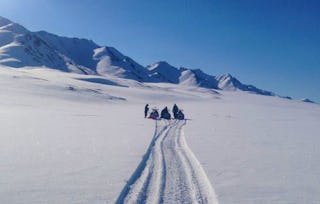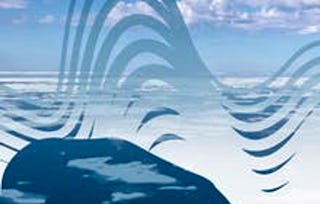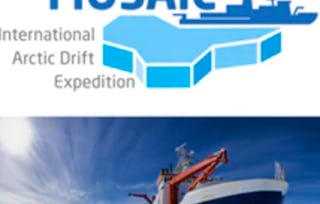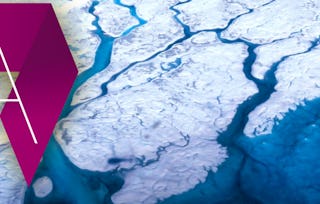Welcome to Arctic: Development! In this third in a series of Arctic MOOCs, brought to you by a unique partnership between the University of Alberta and UiT The Arctic University of Norway, we will be exploring regional development in a changing arctic. In this 4-week course, you will investigate the role that natural resources play across the Indigenous, Nordic, Russian and North American Arctics, different strategies for resource management in different regions, and how these affect community planning and development efforts in an increasingly populated part of the world.

Arctic Development

63 reviews
Recommended experience
What you'll learn
Gain an understanding of concepts in northern sustainability, geopolitics, resource management, planning and development.
Learn about the resilience of northern communities, and strategies/initiatives to combat a rapidly changing Arctic.
Gain an appreciation of regional planning in a changing Arctic
Skills you'll gain
Details to know
13 assignments
See how employees at top companies are mastering in-demand skills

There are 4 modules in this course
Welcome to the first step of your journey in Arctic: Development! In this short, introductory module we'll cover the basics of the Arctic, northern sustainability, geopolitics, resource management and development. To do this, we'll first see how the region is usually viewed through the particular lens of "The Four Arctics". At the end of this module, you'll have the context and vocabulary to tackle some of the issues in resource management, community management, and development, covered in the rest of the course. When it's time to venture north, click on the first video to get started!
What's included
5 videos2 readings1 assignment1 discussion prompt
Welcome back! Now that you have an understanding of the four Arctics and some of the basic concepts affecting development in these regions, it's time to deep-dive into resource management. In this module we'll first take stock of some of the renewable and non-renewable resources in the Arctic, and explore different resource management strategies employed in each of the four Arctics, encountering a number of "tragedy of the commons" case studies. Finally, you'll reflect upon the formation and function of the Arctic Council, and its role in resource management.
What's included
6 videos1 reading4 assignments1 discussion prompt
Now that we're aware of some of the resources in the Arctic and how they're managed, it's time to move on to the people that live there. In this module, we'll turn our attention to community planning and development efforts in an increasingly populated Arctic, and how communities in various Arctic regions form resilience to some of the unique problems faced in these regions.
What's included
7 videos1 reading5 assignments1 discussion prompt
If you're reading this, you've reached the very last module of the course- congratulations! Our previous three modules have given us the background needed to finally tackle the largest question posed in the course: what does development look like in a changing Arctic? In this module, we'll see how climate change is impacting the Arctic, and examine a number of structural and non-structural adaptations that different arctic communities are implementing. Finally, we will look at the strategies and policies directing and maintaining development across the four Arctics in the face of immense environmental change.
What's included
4 videos1 reading3 assignments1 discussion prompt
Instructors

Offered by
Explore more from Governance and Society
 Status: Free Trial
Status: Free TrialUniversity of Colorado Boulder
 Status: Free
Status: FreeUniversity of Alberta
 Status: Preview
Status: PreviewUniversity of Colorado Boulder
 Status: Preview
Status: PreviewÉcole Polytechnique Fédérale de Lausanne
Why people choose Coursera for their career

Felipe M.

Jennifer J.

Larry W.

Chaitanya A.
Learner reviews
- 5 stars
68.25%
- 4 stars
25.39%
- 3 stars
4.76%
- 2 stars
1.58%
- 1 star
0%
Showing 3 of 63
Reviewed on Mar 23, 2022
Excellent, concise, and great foundational points to begin the journey of understanding Arctic Development! Thankyou!
Reviewed on Apr 2, 2023
Very Informed approach to learning what the future holds for Arctic Development
Reviewed on Aug 12, 2021
I liked the content, the pace of speech and explanatory media.

Open new doors with Coursera Plus
Unlimited access to 10,000+ world-class courses, hands-on projects, and job-ready certificate programs - all included in your subscription
Advance your career with an online degree
Earn a degree from world-class universities - 100% online
Join over 3,400 global companies that choose Coursera for Business
Upskill your employees to excel in the digital economy
Frequently asked questions
To access the course materials, assignments and to earn a Certificate, you will need to purchase the Certificate experience when you enroll in a course. You can try a Free Trial instead, or apply for Financial Aid. The course may offer 'Full Course, No Certificate' instead. This option lets you see all course materials, submit required assessments, and get a final grade. This also means that you will not be able to purchase a Certificate experience.
More questions
Financial aid available,


